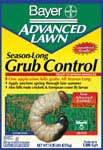Grub Control by Bayer
 |
One application of Bayer’s Grub Control granules and you kill grubs all season long. You can apply it any time from spring through late summer. Usually used on lawns, it can also be used in ground covers and flower beds where grubs are a problem. It kills white grubs, larvae of the European crane fly, and mole crickets. White grubs can be the larvae of Japanese beetles, June beetles, and chafers.
The active ingredient is Imidacloprid. There is only 0.2% of the material in a package. The brand name for Imidacloprid is Merit®. If you can't find this product on the store shelves, any grub control product with Merit® as its active ingredient will the same effecitve job.
Application instructions are on the label. For more information go to Bayer’s Web Site
Warning - Merit might be killing honeybees
I've decided that the phrase "life can be complicated" is bearing down on me and is no longer just a catch phrase. When you have to find a fifth grader to help you learn how to use your iPhone, things are getting complicated.
The same is true for some pesticides commonly used in the home landscape.
Back in the 1960s, most homeowners with a bug problem broke out the DDT and it killed any bug that it touched; pretty simple. It got complicated when Rachel Carson's book "Silent Spring" led to having DDT banned completely from use in the United States because it was harming a whole lot more than the pests.
Likewise, life is getting complicated when deciding to apply the most commonly used insecticide imidacloprid, called Merit on product labels. I've been recommending products containing Merit as the best and safest tool for killing white grubs in the lawn. It doesn't hurt earthworms or any other microbes in the soil; it just kills grubs.
Unfortunately, we are learning that Merit has some ugly side effects, namely causing what has been called colony collapse disorder, where thousands of honeybee colonies are disappearing for no obvious reason. Now we know that any plant that is treated with Merit and has blossoms that attract bees, those bees will receive a non-lethal shot of Merit. But it will cause them to lose their ability to find their way back to the hive. It also weakens the bee's immune system so the bee usually dies of some fungus or virus.
Merit is a very common insecticide in agriculture because it is systemic and very effective in controlling tough to kill insects such as aphids. Many apple orchards are routinely sprayed with Merit early in the season and then when the honey bees come it to pollinate those trees, they disappear. Not a very nice picture.
We yardeners can't deal with the bee problem in agriculture, but we definitely can take a look at how we are using Merit in our own yard. Some of the most effective and popular systemic insecticides for rose bushes have Merit as the main ingredient. Honeybees will always work over rose blossoms and so are exposed to a little bit of Merit -- enough to affect them badly.
A Merit-based insecticide is about the only effective tool to control black vine weevils, often a serious problem on azaleas and rhododendrons, the blossoms of which are magnets for honeybees.
Now to make things complicated, Merit is still an effective way to protect ash trees from the emerald ash borer. The ash blossoms are not attractive to honeybees.
There is still much to learn about Merit. Does it affect honeybees all year or just for a few months after application? Does it work on hemlocks to control the devastating hemlock adelgid just turning up in Michigan? I'll keep watching, but life sure can be complicated.

